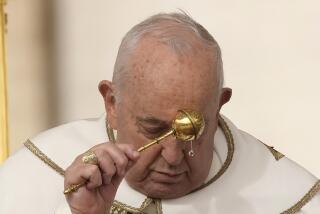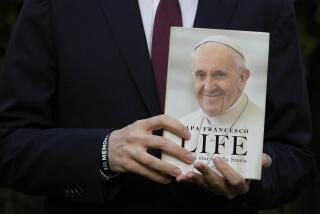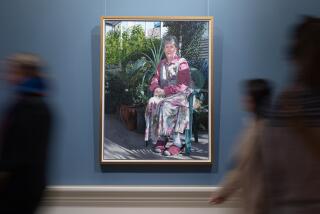Pope Francis tells Ireland sex abuse scandals brought ‘pain and shame’ to Catholics, vows ‘stringent’ changes
Pope Francis on Saturday vowed to adopt “stringent” measures to rid a crisis-convulsed Catholic Church of the “pain and shame” caused by decades of sexual abuse and its tolerance by clerical authorities.
Francis traveled to Ireland, once a bastion of fervent Catholic belief that has been eroded by years of church scandal, and a center of some of the most egregious abuse.
He met privately for an hour and a half with eight survivors, the Vatican said, without providing details. Two of the participants in the meeting later said the pontiff equated the scandal and cover-up with excrement.
In his public appearances, Francis labeled the abuses as “repugnant crimes” but also was greeted with tough language from Irish authorities and others who decried the role of church leadership in permitting the rapes, molestation and other attacks by priests and occasionally nuns.
“The failure of ecclesiastical authorities — bishops, religious superiors, priests and others — to adequately address these repugnant crimes has rightly given rise to outrage, and remains a source of pain and shame for the Catholic community,” the pope said.
Francis’ pledge came after a meeting with Irish Prime Minister Leo Varadkar, who told the leader of the world’s 1.3 billion Catholics that for many in Ireland, “wounds are still open” for survivors of the stream of sex abuse scandals that began to emerge during the 1990s.
With Francis seated to his left, Varadkar raised the latest sex abuse crisis to hit the U.S. church, saying it echoed previous investigations in Ireland.
“We have all listened to heart-breaking stories from Pennsylvania of brutal crimes perpetrated by people within the Catholic Church, and then obscured to protect the institution at the expense of innocent victims,” Varadkar told an audience of politicians as well as religious and civil society leaders.
Marie Collins, an Irish abuse survivor who attended the event, said “I want to see the pope tell us what he is going to do. He’s given us promises, but we do need action.”
Francis’ visit is the second-ever papal visit to Ireland, once one of the world’s most devoutly Catholic countries. The church’s once-dominant influence on public policy has been obliterated in recent years — a sea change made plain by Ireland voting over the last three years to allow same-sex marriage and locally provided abortions.
Francis made brief mention of the “rights of the unborn” as “defenseless” against a “throwaway culture” during his public remarks but otherwise, with attention focused on the church’s response to the latest sex abuse crisis in the U.S., did not comment on Ireland’s reversal of its previously highly restrictive abortion policy.
Varadkar tempered his criticisms of the church by acknowledging its prominent role in healthcare and social welfare services during the years immediately after Ireland won its independence from Britain in 1922.
Though Ireland’s still highly unequal economy has the fourth-highest GDP per capita in the world, according to International Monetary Fund figures, the early decades of independence were blighted by poverty and spurts of mass emigration.
The church played an “overwhelmingly positive role … in Irish society, in developing social services, in the health and welfare areas, which the state wasn’t in a position to provide at the time,” John Bruton, a former Irish prime minister, told The Times.
After his meetings with Irish political leaders, the pope made a number of short visits to various churches, as well as a lightning-fast “popemobile” drive through the center of Dublin, where he waved at crowds lining some of the capital’s main streets.
Teddy Viris, a tourist from New York, said he changed his holiday plans to watch the parade.
“It was worth it,” he said. “I stood here for a couple of hours to hold a spot” for his family to join him at the streetside barricade.
“I thought I might not get to see it,” said Tony Barry, a Dubliner who had a prime viewing spot on O’Connell Bridge, a city landmark. “I was glad to see so many people out with flags. I thought he might not get that reception.”
What sort of reception the pope would get was a concern before the visit. The question was whether Francis would receive no more than a tepid welcome.
On Saturday evening, Francis addressed a crowd of around 80,000 at a Dublin football stadium, the culmination of the World Meeting of Families, a Catholic church festival and conference.
On Sunday, Francis is scheduled to briefly visit a Catholic shrine in Knock in the west of Ireland, before returning to Dublin to say Mass before a projected 500,000 people in a public park. Though significant, the crowd will be less than the estimated 1.2 million who attended when Pope John Paul II, now a saint, said Mass at the same venue in 1979.
The disparity in turnout is being seen as more proof that Ireland is a much-changed country from that which showered adulation on John Paul nearly four decades ago.
Discussing the mood around the pope’s visit, Declan Cassidy, who runs a food market in central Dublin, said “people are interested, they’re curious, but that’s it for the most part,” a muted contrast to the euphoria surrounding John Paul’s three-day visit — said to be the largest public gathering of people in Europe since World War II.
That transition is one that Irish church leaders are trying to come to terms with.
“I think we are in a new space in Ireland,” said Archbishop Éamon Martin, the leader of Ireland’s Catholic bishops. He added that the church realizes that it’s now perhaps a minority but “we want to speak into our public square, with conviction, the wonderful truth of our faith.”
Roughneen is a special correspondent. Times staff writer Tracy Wilkinson contributed from Washington.
UPDATES:
5:15 p.m.: This article was updated with staff reporting.
This article was originally published at 12:50 p.m.
More to Read
Start your day right
Sign up for Essential California for news, features and recommendations from the L.A. Times and beyond in your inbox six days a week.
You may occasionally receive promotional content from the Los Angeles Times.






